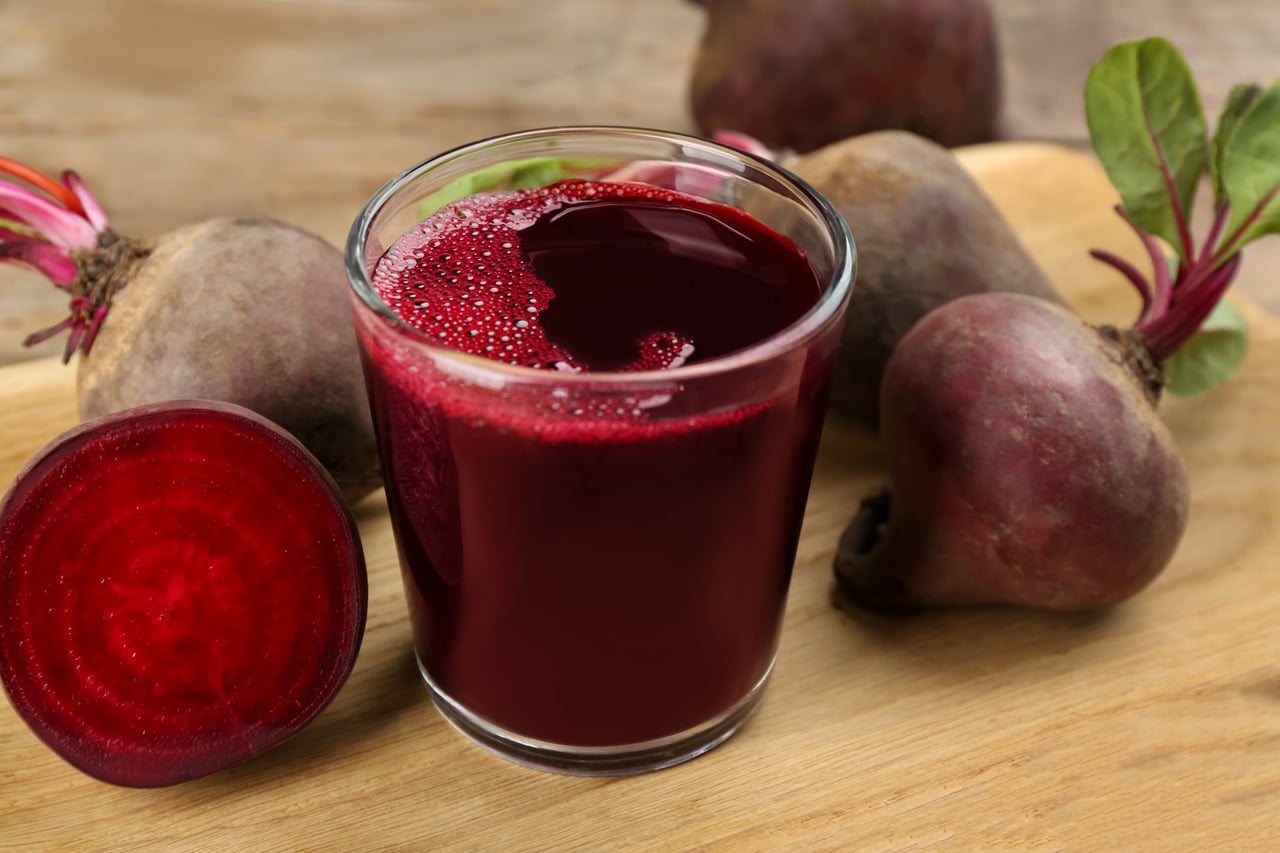Diet and Nutrition
Beetroot Juice: Nature’s Elixir For The Body
[the_ad id=”28200″]
The decisions made during mealtime have a profound impact on an individual’s overall health and well-being. Among the array of healthful options that have the power to shape overall well-being, beetroot juice emerges as a healthy beverage choice. Made using fresh beetroot, this vibrantly coloured and nutrient-dense drink has been steadily gaining recognition. Beyond its visually striking deep red hue, beetroot juice serves a wealth of minerals with numerous health benefits.
This article explores various benefits and consumption regulations of beetroot juice.
Nutritional Profile of Beetroot Juice
A 100 g serving of beetroot juice (non-branded) contains the following nutrients:
- Calories: 23.0 kcal
- Protein: 0.9 g
- Carbohydrates: 4.7 g
- Fibre: 1.9 g
- Calcium: 10.6 mg
- Potassium: 163.5 mg
- Magnesium: 18.2 mg
- Vitamin C: 5.3 mg
Health Benefits of Beetroot Juice
Beetroot’s diverse health benefits make it a wise addition to one’s dietary regimen.
Beetroot Regulates Blood Pressure
Consuming beetroot juice can lead to a notable reduction in blood pressure. This effect is due to nitrates found in beetroot juice, which the body metabolises into nitric oxide. Nitric oxide, in turn, aids in the relaxation and dilation of blood vessels, ultimately lowering systolic blood pressure in individuals with hypertension.
Increases Endurance During Exercise
For those seeking an energy boost to power through their workouts, beetroot juice is the ideal choice. It elevates plasma nitrate levels and enhances physical performance. Over 5–6 days, regular consumption of beetroot juice improves cardiorespiratory performance, enhances performance in time trials, and extends the time until exhaustion. Consequently, it is a favoured option among athletes and fitness enthusiasts striving to push their limits and maximise workout outcomes.
Beetroot Juice Slows The Progression Of Dementia
A diet rich in nitrates, such as those found in beetroot juice, has demonstrated the potential to prevent or slow the dementia progression. In older adults, nitrates can augment cerebral blood flow and mitigate cognitive function decline. The substantial nitrate content in beetroot juice improves blood flow to the frontal lobes, which are closely associated with mental processes. The heightened blood flow enhances cognitive performance, preventing cognitive deterioration linked to conditions like Alzheimer’s.
Beetroot Juice Has Anti-Cancer Properties
The vibrant colour of beets stems from water-soluble antioxidants called betalains. Additionally, they contain other flavonoids and polyphenolic compounds with potential anti-inflammatory and antioxidant attributes. Betalains, regarded as cancer-preventive agents, help in identifying and neutralising free radicals or unstable molecules in the body. Excessive free radicals can exacerbate inflammation and high cancer risk, making beetroot juice a valuable inclusion in a cancer-preventive diet.
Beetroot Juice Prevents Anaemia
Iron deficiency, known as anaemia, may affect those with low iron levels. Including iron-rich foods, such as beetroot juice, is helpful. Beetroots are rich in iron, a vital element for the production of red blood cells, which transport oxygen throughout the body.
Beetroot Juice Helps Lower Cholesterol
Beetroot juice, due to its betanin content, can assist in lowering LDL or “bad” cholesterol levels. Dietary fibre found in beets binds to cholesterol particles, facilitating their elimination from the body. Furthermore, the conversion of nitrates into nitric oxide within the body relaxes blood vessels, promoting improved blood flow and contributing to the reduction of LDL cholesterol levels.
[the_ad id=”28200″]
Summary
Beetroot juice offers a range of health benefits, such as a reduction in blood pressure due to its nitrate content, which the body converts to nitric oxide, promoting blood vessel relaxation. Athletes and fitness enthusiasts favour it for its potential to enhance exercise endurance and performance. A diet rich in nitrates from beetroot juice can potentially slow the progression of dementia by improving cerebral blood flow. The antioxidants in beets, including betalains, exhibit anti-cancer properties by neutralising free radicals. Additionally, beetroot juice is a valuable resource for those seeking to prevent anaemia or manage cholesterol levels.
Ways to Incorporate Beetroot Juice in Diet
You can include beetroot juice in your diet in the following ways:
Pure Juice of Beets: A simple glass of beetroot juice is the easiest to enjoy. You can buy beetroot juice from a shop or use a juicer to juice fresh beetroots.
Smoothies: To add extra nourishment to smoothies, squeeze in some beetroot juice. It will raise the nutritional content and improve the flavour.
Salad Dressing: Combine beetroot juice with olive oil, balsamic vinegar, honey, and preferred seasonings. It can give your salads a distinctive flavour and a burst of colour.
Soup: Homemade soups can benefit from the addition of beetroot juice. It can give your soups a beautiful scarlet colour and a rich, earthy flavour. Sweet potatoes, ginger, and carrots are good combinations with beetroot.
Sauces: Blend beetroot juice with yoghurt, garlic, and a little lemon juice to make a beetroot sauce. You may use this sauce as a topping for grilled fish or as a dip for vegetables.
Summary
Beetroot juice is a tasty and nutrient-dense addition to your diet. It’s excellent as a non-alcoholic beverage on its own, mixed into smoothies, made into colourful salad dressings, or used as a soup foundation. It adds vibrancy to sauces, marinades, and even sweets. Additionally, beetroot juice might be a hidden element in light-hearted drinks like cocktails.
Potential Side Effects
Although beetroot juice is safe and has many health advantages, there are a few possible side effects to be mindful of:
Gastrointestinal Distress: Beetroot juice consumption may cause gastrointestinal distress in people, including gas, bloating, and diarrhoea. If you have a delicate digestive system or consume excessive amounts of beetroot juice, this is more likely to occur. You can lower this risk by increasing your consumption gradually and starting with smaller amounts.
Kidney Stones: Beetroots contain a high content of oxalates, which may put people at risk for developing kidney stones. It is best to restrict your beetroot juice consumption and get advice from a healthcare provider if you have a history of kidney stones or are at risk.
Blood Pressure: Beetroot juice is well known for its potential to lower blood pressure. However, if you already have low blood pressure, consuming too much of it may cause it to drop too much, which could make you feel lightheaded or dizzy.
Increasing Sugar Intake: Beetroot juice can include a lot of sugar because beetroots are inherently sweet. Watch how much beetroot juice you drink if you’re trying to cut back on sugar. Whenever feasible, choose fresh beetroot juice without any added sugar.
Summary
Beetroot juice use may have some unfavourable impacts. When taken in excess, it might result in low blood pressure, gastrointestinal distress, and tooth discolouration. Furthermore, in those who are predisposed, the high oxalate level of beets may have a role in kidney stone formation. Beet allergy sufferers should exercise caution, and those using certain drugs should speak with a healthcare provider to be sure there are no drug interactions. Beetroot juice has several health benefits that people can safely enjoy in moderation and with an understanding of these potential adverse effects.
FAQs
Q. What is beetroot juice, and how is it made?
A: Beta vulgaris, the scientific name for beets, is used to make this vibrant beverage. Fresh beetroots are usually cleaned, peeled, and sliced into smaller pieces to prepare beetroot juice.
Q. What are the critical nutrients in beetroot juice?
A: Beetroot juice has a lot of dietary nitrates, which are known to decrease blood pressure and strengthen heart health. It is also a great source of folate, potassium, and vitamin C. In addition to providing necessary nutritional fibre, it has antioxidants such as betalains.
Q. Can beetroot juice help lower blood pressure naturally?
A: Yes, beetroot juice has a natural ability to reduce blood pressure. The leading cause of this is its high nitrate content, which the body uses to produce nitric oxide, a substance that widens and relaxes blood vessels. This dilatation eventually lowers blood pressure by improving blood flow and reducing resistance.
Q. Are there specific compounds in beetroot juice responsible for its health benefits?
A: Dietary nitrate is the main ingredient that is found in beetroots naturally in large amounts. The body transforms dietary nitrate into nitric oxide, which helps to dilate blood vessels, improve blood flow, and control blood pressure. Beetroot juice also has overall health-promoting qualities since it includes betalains, a class of antioxidants with anti-inflammatory and detoxifying qualities.
Q. How does beetroot juice impact athletic performance and endurance?
A: The high nitrate level of beetroot juice can have a good effect on endurance and athletic performance. The body transforms nitrate into nitric oxide, which enhances blood flow and muscle oxygen delivery. Improved endurance and performance can eventually result from this increased oxygen utilisation, which can also postpone muscle tiredness.
Q. Are there potential benefits of beetroot juice for heart health?
A: Yes, beetroot juice may be suitable for heart health. Because of its high nitrate content, it can produce nitric oxide, a substance that expands and relaxes blood vessels to help decrease blood pressure and enhance cardiovascular health in general. Additionally, it is high in antioxidants, especially betalains, which have cleansing and anti-inflammatory qualities that lessen oxidative stress on the heart.
Q. Can beetroot juice improve digestion and promote gut health?
A: High in fibre, beets encourage the formation of beneficial bacteria in your digestive system. An abundance of healthy bacteria in your digestive tract strengthens your immune system and aids in the battle against disease. Additionally, fibre enhances digestion and lowers the chance of constipation.
Q. Is beetroot juice beneficial for detoxification and cleansing the body?
A: Thanks to its betaine content, which prevents and reduces fatty deposits in the liver, beetroot aids in the detoxification process. It works wonders as a purifier by drawing impurities into the colon, where they get eliminated.
Q. Are there antioxidants in beetroot juice, and how do they benefit health?
A: Antioxidants are present in beetroot juice, especially in the form of a class of chemicals called betalains. By lowering oxidative stress and inflammation, they lessen the risk of chronic diseases. Beetroot juice contains betalains, which can aid in detoxifying and promote general health.
Q. Does beetroot juice have anti-inflammatory properties?
A: Yes, beetroot juice has anti-inflammatory qualities. The presence of betalains, a class of antioxidants present in beetroots, is mainly responsible for these qualities. By neutralising free radicals, betalains aid in the reduction of inflammation in the body.
Q. Can beetroot juice support brain health and cognitive function?
A: It’s possible that beetroot juice enhances cognitive performance and brain health. It has a high nitrate content, which can increase oxygen delivery and blood flow to the brain. Increased attention, memory, and mental clarity are among the cognitive benefits of this improved cerebral circulation.
Q. Are there potential benefits of beetroot juice for skin and hair?
A: The health of your skin and hair may benefit from beetroot juice. Its abundant supply of vitamins, minerals, and antioxidants—including betalains and vitamin C—can help brighten skin and lessen the appearance of ageing. Beetroot juice also contains iron and folate, which may promote healthy hair development.
Q. How does beetroot juice affect liver health and detoxification processes?
A: One of the most incredible natural treatments for fatty liver is beetroot juice, which is rich in fibre, antioxidants, and vital minerals. Its ingredients support improved fat-elimination processes and liver detoxification.
Q. Are there studies or scientific evidence supporting the health claims of beetroot juice?
A: Yes, a plethora of scientific research backs up the health benefits of beetroot juice. Studies have indicated that beetroot juice’s high nitrate content can successfully reduce blood pressure, improve cardiovascular health, and increase athletic performance. Numerous studies have also shown its anti-inflammatory and antioxidant qualities, especially the presence of betalains, indicating the possible advantages for general health.
Q. What is the recommended daily intake of beetroot juice for optimal health benefits?
A: The amount of beetroot juice to drink each day can change based on tolerance and personal health objectives. Starting with between 100 and 200 millilitres per day and progressively increasing as necessary is a standard recommendation. Beetroot juice can be beneficial for a variety of conditions, so it’s essential to listen to your body, take it in moderation, and see a doctor if necessary.
[the_ad id=”28200″]
Related Posts
- Tart Cherry Juice Advantages, Aspect Results & How To Drink It
The precise quantity of tart cherry juice it's good to devour to reap these advantages…
- Take pleasure in This Alkaline Veggie Juice Anytime
Alkaline juice - what is that this fancy-sounding juice, and why must you trouble incorporating…
- Wholesome Herbed Hen Rissoles and Beetroot Salad Recipe
These scrumptious calmly herbed and spiced rooster rissoles served with a ravishing salad of roasted…


















